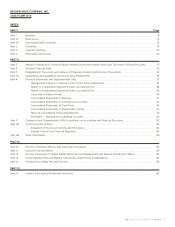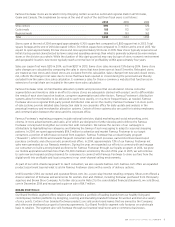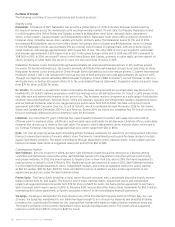Famous Footwear 2014 Annual Report Download - page 18
Download and view the complete annual report
Please find page 18 of the 2014 Famous Footwear annual report below. You can navigate through the pages in the report by either clicking on the pages listed below, or by using the keyword search tool below to find specific information within the annual report.2014 BROWN SHOE COMPANY, INC. FORM 10-K 17
Foreign currency fluctuations may result in higher costs and decreased gross profits.
Although we purchase most of our products from foreign manufacturers in United States dollars and otherwise engage
in foreign currency hedging transactions, we cannot ensure that we will not experience cost variations with respect to
exchange rate changes. Currency exchange rate fluctuations may also adversely impact third parties who manufacture
the Company’s products by making their purchases of raw materials or other production costs more expensive and more
dicult to finance, resulting in higher prices and lower margins for the Company, its distributors and licensees.
Our business, sales and brand value could be harmed by violations of labor, trade or other laws.
We focus on doing business with those suppliers who share our commitment to responsible business practices and
the principles set forth in our Production Code of Conduct (the “PCOC”). By requiring our suppliers to comply with the
PCOC, we encourage our suppliers to promote best practices and work toward continual improvement throughout their
production operations. The PCOC sets forth standards for working conditions and other matters, including compliance
with applicable labor practices, workplace environment and compliance with laws. Although we promote ethical business
practices, we do not control our suppliers or their labor practices. A failure by any of our suppliers to adhere to these
standards or laws could cause us to incur additional costs for our products, could cause negative publicity and harm our
business and reputation. We also require our suppliers to meet our standards for product safety, including compliance with
applicable laws and standards with respect to safety issues, including lead content in paint. Failure by any of our suppliers
to adhere to product safety standards could lead to a product recall, which could result in critical media coverage, harm our
business and reputation, and cause us to incur additional costs.
In addition, if we, or our suppliers or foreign manufacturers, violate United States or foreign trade laws or regulations,
we may be subject to additional duties, significant monetary penalties, the seizure and forfeiture of the products we are
attempting to import or the loss of our import privileges. Possible violations of United States or foreign laws or regulations
could include inadequate record keeping of our imported products, misstatements or errors as to the origin, classification,
marketing or valuation of our imported products, fraudulent visas or labor violations. The eects of these factors could
render our conduct of business in a particular country undesirable or impractical and have a negative impact on our
operating results.
Our retail business depends on our ability to secure aordable and desirable leased locations without creating a
competitive concentration of stores.
The success of the retail business within our Famous Footwear and Brand Portfolio segments depends, in part, on our
ability to secure aordable, long-term leases in desirable locations for our leased retail footwear stores and to secure
renewals of such leases. No assurance can be given that we will be able to successfully negotiate lease renewals for existing
stores or obtain acceptable terms for new stores in desirable locations. In addition, opening new Famous Footwear stores
in our existing markets may result in reduced net sales in existing stores as our stores become more concentrated in the
markets we serve. As a result, the number of consumers and financial performance of individual stores may decline and the
average sales per square foot at our stores may be reduced.
Our reputation and competitive position are dependent on our ability to license well-recognized brands, license our own
brands under successful licensing arrangements and protect our intellectual property rights.
Licenses – Company as Licensee
Although we own most of our wholesale brands, we also rely on our ability to attract, retain and maintain good
relationships with licensors that have strong, well-recognized brands and trademarks. Our license agreements are generally
for an initial term of two to four years, subject to renewal, and there can be no assurance that we will be able to renew
these licenses. Even our longer-term or renewable licenses are typically dependent upon our ability to market and sell
the licensed products at specified levels, and the failure to meet such levels may result in the termination or non-renewal
of such licenses. Furthermore, many of our license agreements require minimum royalty payments, and if we are unable
to generate sucient sales and profitability to cover these minimum royalty requirements, we may be required to make
additional payments to the licensors that could have a material adverse eect on our business and results of operations.
In addition, because certain of our license agreements are non-exclusive, new or existing competitors may obtain licenses
with overlapping product or geographic terms, resulting in increased competition for a particular market.
Licenses – Company as Licensor
We have entered into numerous license agreements with respect to the brands and trademarks that we own. While we have
significant control over our licensees’ products and advertising, we generally cannot control their operational and financial
issues. If our licensees are not able to meet annual sales and royalty goals, obtain financing, manage their supply chain,
control quality and maintain positive relationships with their customers, our business, results of operations and financial
position may be adversely aected. While we would likely have the ability to terminate an underperforming license, it may
be dicult and costly to locate an acceptable substitute distributor or licensee, and we may experience a disruption in our
sales and brand visibility. In addition, although many of our license agreements prohibit the licensees from entering into
























